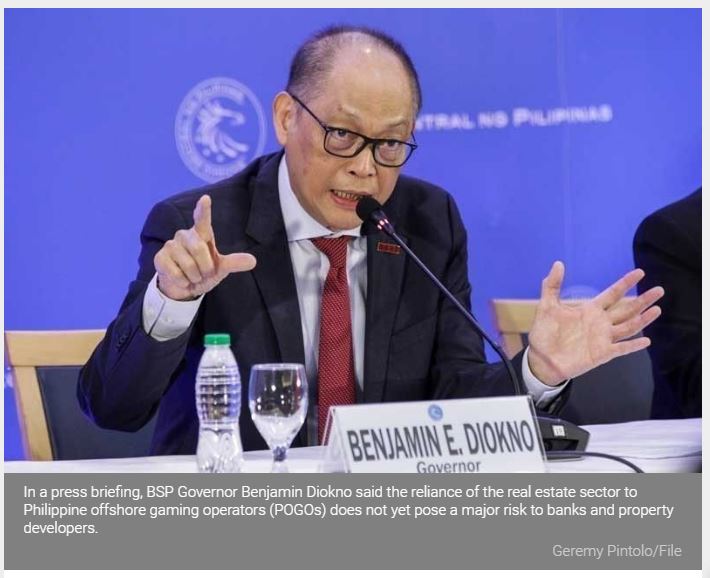Philippines: BSP downplays POGO riskson banking, property sectors
MANILA, Philippines — The Bangko Sentral ng Pilipinas (BSP) has downplayed the risks posed by the offshore gaming industry to the real estate and banking sectors, saying measures are in place to manage the exposure of banks.
In a press briefing, BSP Governor Benjamin Diokno said the reliance of the real estate sector to Philippine offshore gaming operators (POGOs) does not yet pose a major risk to banks and property developers.
“I don’t think POGOs pose such a big risk. Of course there is a risk but it’s not going to upset the growth of the economy,” Diokno said.
He said this in response to a report by US-based credit watcher Fitch Ratings, which said that the sustained surge in property prices – driven by the boom in the POGO industry – presents rising risks to banks and real estate firms.
The BSP chief said big real estate companies are “conservative,” only setting aside a portion of their total occupancy for a certain sector.
“Plus, in the case of POGOs, they ask for one year advance payment so there will be no abrupt change. There will be one-year rental already secured. So that’s the situation. So it does not pose a risk,” he added.
Lyn Javier, managing director of BSP’s Policy and Specialized Supervision Sub-sector, said the central bank has also set out credit risk management guidelines to protect the banking sector.
“What’s important is that lending to this real estate companies, such as POGOs, are anchored on some credit underwriting,” Javier said. “We have also some measures in place, such as real estate exposures and single borrowers limit.”
Furthermore, she said stress tests showed that the banking industry is still capable of managing risks due to their exposure to the real estate industry.
“We use stress test exposure of banks to the real estate industry and assess whether their capital can actually absorb potential losses to these exposure. We’re satisfied with the results of these stress tests,” Javier said.
According to Fitch, property prices in the Philippines have experienced some of the strongest growth of any major real estate market since 2010, in real terms. However, in recent months, the pace of increase has accelerated.
Fitch said the increase partly reflects the 75-basis point decline in interest rates last year, as well as the strong demand from the POGO sector, which accounted for around 30 percent of Metro Manila office demand over the past two years.
It warned prolonged rapid house price inflation tends to spur borrowers to take on more debt to afford increasingly expensive homes, particularly if the trend stimulates further speculative price appreciation.
It could also lead developers to over-invest in future supply, risking an inventory overhang if demand weakens, Fitch said.
“A higher reliance on the POGO sector to drive real-estate demand exposes banks and property firms to greater policy risks,” it said.
Source: https://www.philstar.com/business/2020/01/20/1986139/bsp-downplays-pogo-riskson-banking-property-sectors


 Thailand
Thailand




